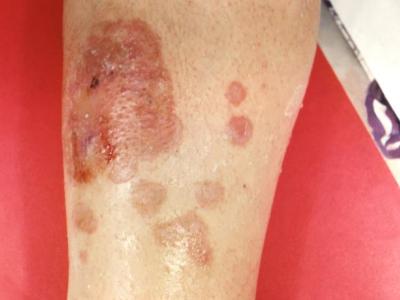Only 5 weeks after its first meeting, a World Health Organization (WHO) Zika emergency committee met today to discuss rapidly accumulating evidence that shows a stronger link between the virus and serious complications such as birth defects and neurologic problems, which led to stronger and more finely tuned recommendations.
Besides keeping in place its public health emergency recommendation, the group now recommends that pregnant women avoid travel to affected areas, though it said a more general travel ban isn't warranted.
In other developments, Brazilian investigators documented a microcephaly rise in babies of women who were in their first trimesters of pregnancy in the country's early hard-hit areas, and Puerto Rico started receiving blood shipments from the continental United States to boost its supply of safe products.
Emergency committee findings
At a media briefing in Geneva today, WHO Director-General Margaret Chan, MD, MPH, said since the group last met on Feb 1, more clinical and epidemiologic studies have been published, evidence suggests a neurotropic effect of the virus, affected areas have increased, the range of the virus has expanded, and sexual transmission has shown to be more common than expected.
In its first meeting, the emergency committee recommended that the Zika virus developments constituted a public health emergency of international concern, not because of the clinical illness, which is typically mild, but because of the strongly suspected worrisome complications.
"All of this news is alarming," she said, adding that with the onset of the rainy season and an increase in dengue infections, health officials expect to see more illnesses and areas affected.
The committee said more work is needed to definitively prove a link between birth defects such as microcephaly (smaller-than-normal heads) and Guillain-Barre syndrome (GBS), and pinpointed the types of studies that are still needed, such as ones exploring any clinical differences between the Asian strain of the virus, the one implicated in the outbreak in the Americas, and the African strain that has reportedly fueled a recent outbreak in Cape Verde, which has not reported a related rise in microcephaly.
Referencing the committee's ongoing analysis and recommendations, Chan said, "Strong public health actions shouldn't wait for scientific proof."
In a change from its initial recommendations, which urged caution and information for pregnant travelers, the WHO emergency committee now advises them to avoid travel to areas experiencing ongoing outbreaks.
David Heymann, MD, who chairs the 18-member emergency committee, said the group felt the need to step up its recommendation because of the accumulating evidence linking maternal infection to microcephaly and a range of other birth defects, and he noted that the strengthened guidance could be useful as a benchmark for countries making their own travel recommendations. Heymann is with the London School of Hygiene and Tropical Medicine.
The group also recommended that pregnant women with male partners who travel to or live in affected areas practice safe sex or abstain during pregnancy. The committee also fine-tuned its recommendations for surveillance, vector control, clinical care, and risk communications.
At today's briefing, Chan noted that the WHO has received only $3 million so far from its request of $56 million to support the Zika virus response.
WHO emergency committees typically meet every 3 months or more frequently, based on new developments.
The WHO is also hosting a Zika virus countermeasure research and development meeting, which began on Mar 7 and wraps up tomorrow. Officials are expected to unveil the most promising prospects to move forward on research involving drugs, vaccines, and diagnostic tests and a roadmap for their development tomorrow at the conclusion of the meeting.
Zika hot spots and microcephaly
Even as the WHO committee met today to weigh an onslaught of new findings, Brazilian researchers released another new study supporting a link between Zika infections during a woman's first trimester of pregnancy and microcephaly outcomes. The team from Brazil's health ministry and the Pan American Health Organization (PAHO) published its findings today in an early online edition of Morbidity and Mortality Weekly Report (MMWR).
Microcephaly numbers increased sharply in Brazil last year, led by reports from states including Bahia, Paraiba, and Pernambuco in the country's northeast, the area hit first by the virus.
The analysis of 574 microcephaly cases identified through a new ad hoc surveillance system for the birth defect found that microcephaly prevalence in the 15 Brazilian states with confirmed Zika virus transmission was significantly higher than in 4 states without Zika virus transmission: 2.8 cases per 10,000 live births compared with 0.6 per 10,000.
When the investigators looked at timing of the Zika outbreak and microcephaly outcomes, they observed that an outbreak hit Pernambuco, the state with the largest microcephaly case increase, in December 2014 and that the first trimester of pregnancy in mothers of babies born with microcephaly occurred from late February through mid May 2015. Investigators saw a similar pattern in Paraiba and Bahia.
The researchers said the findings highlight the temporal relationship between Zika virus transmission and a sharp increase in microcephaly births, providing additional evidence for the role infection plays during the first trimester of pregnancy.
HHS blood shipments begin in Puerto Rico
Elsewhere in the outbreak region, Puerto Rico on March 5 received its first shipments of blood products from the continental United States, according to a statement yesterday from the US Department of Health and Human Services (HHS). It said that it is arranging and funding the shipments to ensure an adequate and safe blood supply to the territory's residents.
HHS said scientific evidence suggests that Zika and other flaviviruses can transmit through blood products. In early February, Brazilian health officials confirmed that country's first known case of Zika infection from blood transfusions. Based on concerns about the threat to the blood supply, US blood donor organization announced voluntary donor deferral steps for people who have traveled to the affected areas, and since then, federal officials and the WHO have released guidance for protecting blood supplies.
Last week, Cerus Corp. and Puerto Rico's largest blood center signed an agreement to implement pathogen reduction technology, a system known as INTERCEPT, to help protect Puerto Rico's blood supply during the Zika virus outbreak, according to a Mar 3 statement.
Jose Alsina, vice president and chief operating officer of Banco de Sangre de Servicios Mutuos, the blood center, said in the statement that the territory depends heavily on local blood donations and that the pathogen reduction system will help ease logistics and cut the cost of purchasing blood components from the United States.
Other developments
- President Obama's $1.9 billion emergency request to prepare for and battle Zika virus appears to be stalled in Congress, with House Republicans insisting that the administration use $2.7 billion in unspent Ebola outbreak funds, STAT News reported today. White House officials said some money could be shifted, but not enough to support the Zika response.
- The WHO yesterday provided more information on GBS cases reported in French Polynesia's Zika virus outbreak in 2013 and 2014. In a statement, it said 42 patients were admitted to the hospital with GBS during the outbreak, a 20-fold increase, with 16 of them needing intensive care and 12 requiring mechanical ventilation. No deaths were reported. Most patients reported Zika symptoms a median of 6 days before neurologic symptoms began.
See also:
Mar 8 WHO Zika emergency committee statement
Mar 8 Margaret Chan statement
Mar 8 MMWR report
Feb 4 CIDRAP News story "Brazil confirms blood-transfusion Zika; PAHO calls for global support"
Mar 3 Cerus Corp press release
Mar 7 WHO statement




















